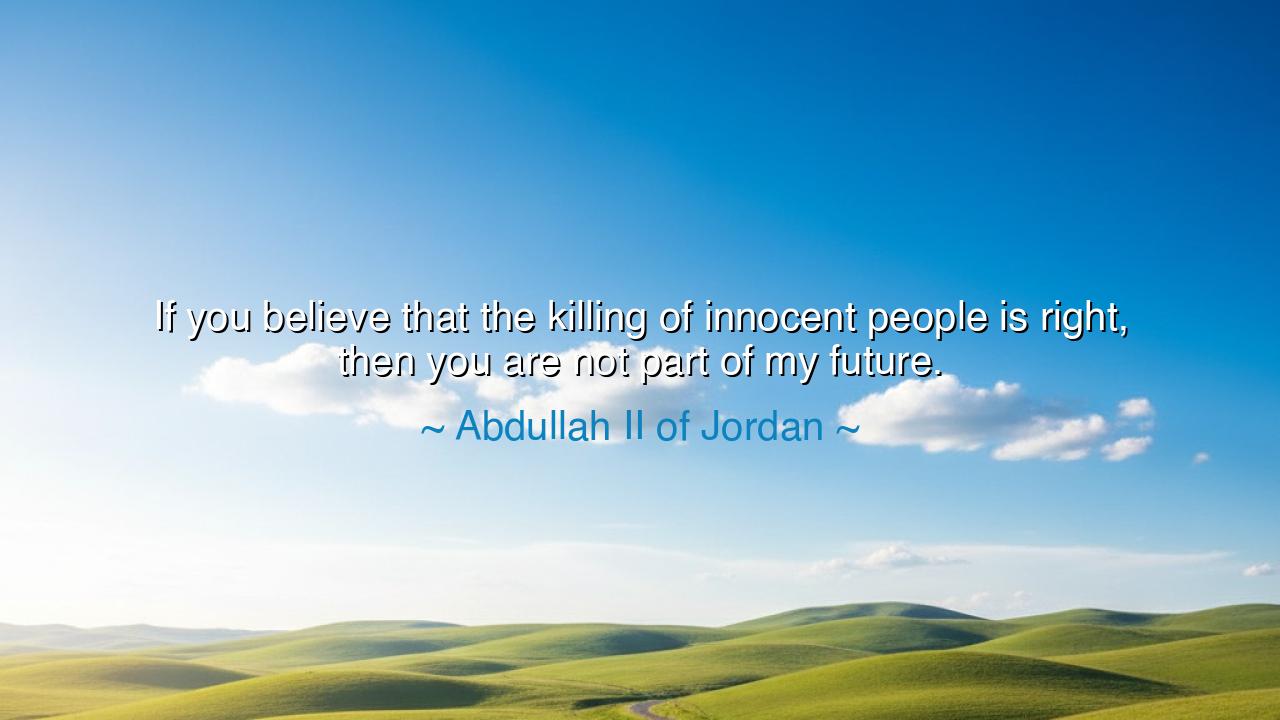
If you believe that the killing of innocent people is right, then
If you believe that the killing of innocent people is right, then you are not part of my future.






In the course of human history, there has always been a moral line that separates the righteous from the unjust, the honorable from the corrupt. Abdullah II of Jordan’s words, “If you believe that the killing of innocent people is right, then you are not part of my future,” resonate with an ancient and universal principle—that the sanctity of life is at the core of what makes us human. To take the life of an innocent is not just an act of violence; it is an assault on the very principles that bind us together in a shared future. This declaration speaks to the belief that peace and justice are not just ideals to be aspired to but necessities for a world where the future of humanity can be shaped in freedom and dignity.
The ancients recognized the sacredness of life and the deep harm caused when it is taken without cause. In Greek philosophy, the concept of justice was often intertwined with the protection of human life. Plato, in his works, often explored the idea that a just society is one where innocence is protected, and violence is never used as a means to an end. His ideal was that virtue and wisdom would guide the rulers of the city, ensuring that they would never condone or allow the taking of innocent life. In much the same way, Abdullah II’s statement highlights that violence against the innocent is not merely an immoral act but one that directly threatens the very foundation of any society that seeks to live in peace and justice.
Consider the example of the Roman Empire, which, at its height, saw its power and legitimacy come under question not just because of military defeats but because of moral failures such as the enslavement and murder of innocents. The philosophers of the time, like Cicero, often spoke out against the corruption of justice, emphasizing that the law was meant to protect the innocent and prevent the abuse of power. Cicero believed that a nation’s true strength came from its adherence to justice, and that any ruler who sanctioned the killing of innocents was leading his people down a path of self-destruction. Abdullah II’s call for a future free from the bloodshed of innocents is a direct echo of these ancient principles: that to protect the future, we must first protect life and honor justice.
The greatest tragedy in the history of humankind is that the cycle of violence against the innocent is often perpetuated in the name of ideology, religion, or political gain. The story of the Crusades in the Middle Ages, for instance, is a stark reminder of how good intentions can become twisted and misused. The Crusaders, believing they were fighting for religious purity, justified the killing of countless innocents in the name of God. Yet, in the aftermath, what remained was not righteousness but destruction and suffering. Abdullah II’s words remind us that violence, especially when directed at the innocent, only destroys the very fabric of society and violates the sacredness of life. It is a path that leads to no future, only more violence and division.
The Buddhist teachings, too, place a strong emphasis on the value of life and the harm that comes from taking it. The principle of Ahimsa, or non-violence, is central to the teachings of the Buddha, who taught that all life is interconnected and that to harm one is to harm all. In this ancient tradition, the act of killing the innocent is seen not only as a moral wrong but as a disruption of the harmony of the universe itself. Abdullah II’s statement echoes this timeless teaching: to commit violence against the innocent is to go against the very laws of nature, and it is a denial of the future, not just for the victims, but for those who perpetuate it as well.
The lesson that Abdullah II imparts is that the future of humanity is tied to our ability to preserve life, to safeguard the innocent, and to resist the temptation to justify violence in the name of any cause. The path of peace, of justice, and of righteousness lies in our collective refusal to accept the killing of innocents as a legitimate tool for any purpose. This truth has been handed down through the ages, from the Stoics to the Buddhists, from ancient philosophers to modern leaders, and it continues to resonate today. Abdullah II’s message is one of hope and responsibility: that each generation has the power to shape the future by rejecting violence and honoring the sanctity of life.
In your own life, take a moment to reflect on how you view the sanctity of life. Are there areas where you have justified violence, whether in thought or action, against the innocent? Are you complicit in systems that allow harm to be done to others? Speak out against injustice, stand against violence, and value life as the precious gift that it is. Like Abdullah II, we must all recognize that the future we want to see is one where peace is not just an ideal, but a practice we live by, every day, in every interaction. Let your actions be a testament to the belief that the future is one where the innocent are protected, the violence is rejected, and justice reigns.






AAdministratorAdministrator
Welcome, honored guests. Please leave a comment, we will respond soon